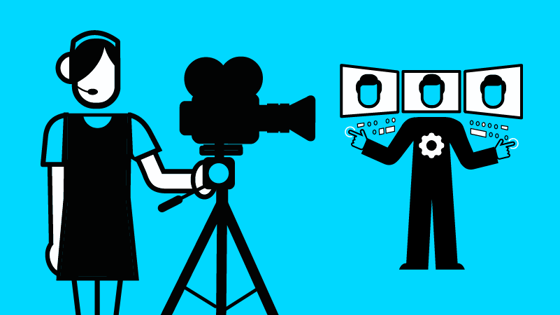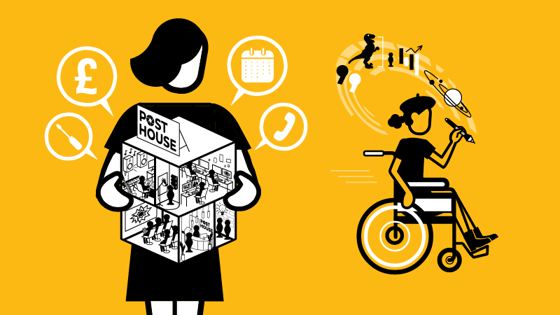Games
Lead games designer
Also known as: Creative director, Game designer, Game developer, Game director, Gameplay designer, Lead level designer, Principal game designer

What does a lead games designer do?
Lead games designers are responsible for how a game looks and what it’s like to play. They work with a small team figuring out the characters and props and what’s going to happen. Then they share those ideas with the rest of the team.
Once a game is being made, they make sure deadlines and budgets are met. They are the ones that decide if changes need to be made.
In smaller studios, they might do a wide variety of jobs too – the art, programming and marketing. But in large studios they would have writers, lead animators, creative directors and gameplay designers to help.
Watch and read
- Careers in video games: lead level designer (Stuart, Ubisoft) - one minute mentor
- Careers in video games: principal game designer (Mike, Playground Games) - one minute mentor
- Careers in video games: game director (Max, Glitches) - one minute mentor
- What are video game designer job roles?
- Day in the life: computer game designer
What’s a lead games designer good at?
- Knowledge of gameplay: imagine the best gameplay or game mechanics for the experience
- Knowledge of game engines: understand games engines and their abilities and limitations, have some programming skills and knowledge of UX and UI
- Communication: share the vision of the game with artists, programmers, producers and marketing staff, be persuasive with publishers
- Knowledge of the games market: aware of industry trends, able to explain the game within that context
- Project management: plan the creative production of the game
Who does a lead games designer work with?
Lead games designers work with artists, programmers, producers, marketing staff and publishers.
How do I become a lead games designer?
Lead games designers comes through a variety or routes. Some come from QA, some from 3D modelling, some from programming. Look at our QA tester job profile, generalist programmer job profile and 3D modelling artist job profile for details of how to get into the industry through these routes.
At school or college:
This is a role where both art and science is useful.
If you want to go to university:
Take A-levels, Highers, Level 3 BTECs or UALs in a combination of arts and sciences from the following subjects.
- Art
- Art and design
- Graphic design
- Graphic communication
- Computer science
- Mathematics
- Physics
- Creative digital media production
If you want to go straight into a job or apprenticeship, the following Level 3 qualifications will be relevant:
- Aim Awards Diploma/Extended Diploma in Games Animation and VFX
- BTEC Diploma in Graphics
- BTEC Diploma in Digital Games Design and Development
- BTEC Diploma in Computing for Creative Industries
- UAL Diploma/Extended Diploma in Art and Design
- AQA Technical Level Entertainment Technology: Video Games Art & Design Production
- OCR Technical Diploma in Digital Media (Digital Content for Interactive Media)
- UAL Diploma/Extended Diploma in Creative Media Production & Technology
- AQA Technical Level IT: Programming
- OCR Technical Diploma in IT (Digital Software Practitioner)
Play games:
Play lots of different games. Think about how the game mechanics works.
Build a portfolio:
Create work that you can show off to employers. This is essential. Go to build your games portfolio to learn how.
Start modding:
Create levels of a game using software provided by the publishers.
Get a degree:
Most people in the games industry have a degree, so you can think about getting one related to games. You could get one related to computer science, art, graphic design, programming or 3D computer modelling. Have a look at ScreenSkills’ list of recommended courses and select one in games. We endorse courses when they offer training in the relevant software, dedicate time to building a portfolio and have strong links with the games industry.
Network:
Get to know people in the games industry by attending events, including games conferences and expos. Meet professionals and ask them questions about their work, while demonstrating interest and knowledge in the industry. Offer to provide them with your professional contact details and try to stay in touch with them. Go to how to network well to learn how to do this.
Search for jobs:
Getting a job in quality assurance (QA) as a games tester is a good way of getting to know the industry, learn the process of making games and build up contacts. If you do that, make sure you keep yourself skilled and keep making games so you can move into design. If you already have experience as a games programmer or artist, use the UK Games Map to find out if there are games companies near you. Then go to their websites directly and check out their open roles. Look for entry-level roles and get into the industry as a way into games design.
You might also be interested in…
Being a director, production designer or post-production supervisor in the film and TV drama industries. You might also be interested in being a visual effects (VFX) producer, VFX supervisor or look development artist in VFX. Alternatively, you could consider being a director, head of story or art director in the animation industry.







